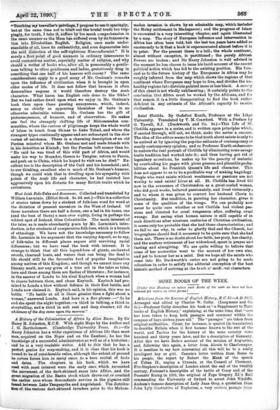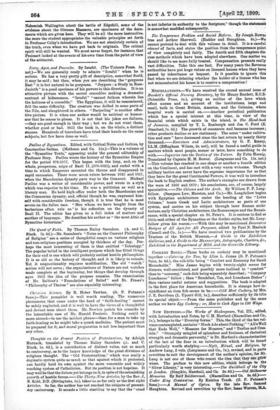SOME BOOKS OF THE WEEK.
[Under This Heading we notice such Books of the week as hare not hem reserved for review in other forms.]
Selections from the Sources of English Hi stor y, B.C. 55—A 18 . Arranged and edited by Charles W. Colby. (Longmans and Co. Gs.)—Professor Colby describes his book as "a Supplement to Text- books of English History," explaining, at the same time, that "care has been taken to keep both passages and comment within the compass of boys sixteen years old." The " passages " are taken from original authorities. Cmsar, for instance, is quoted (in translation) to describe Britain when it first became known to the rest of the world, and Tacitus for the history of the same country some hundred and thirty years later, and for a description of Germany. After this we have Bede's account of the mission of Augustine, and, following this again, a letter from Alcuirt to Charlemagne. It is needless to say how interesting all this will be to a really intelligent boy or girl. Cannte's letter written from Rome to his people, the report by Robert the Monk of the speech of Urban IL, urging a Crusade, at the Council of Clermont, Fitz-Stephen's description of London about the end of the twelfth century, Froissart's descriptien of the battle of Crecy and of the Peasants' Rising in 1381, the original of Pope Gregory XI.'s Bull commanding the University of Oxferd to arrest John Wycliffe. Ascham's famous description of Lady Jane Grey, a quotation from John Lyly illustrative of Euphuism, a very curious passage from
Nehemiah Wallington about the battle of Edgehill, some of the ereidenoe about the Glencoe Massacre, are specimens of the docu- ments which are given here. They will be all the more instructive, the more the student appropriates the valuable principles set forth In Professor Colby's introduction. We are not absolutely certain of the truth, even when we have got back to originals. The critical spirit will still be wanted. We must never forget, for instance, that Froissart looked at the events of his own time from the point of view of the aristocrat.







































 Previous page
Previous page